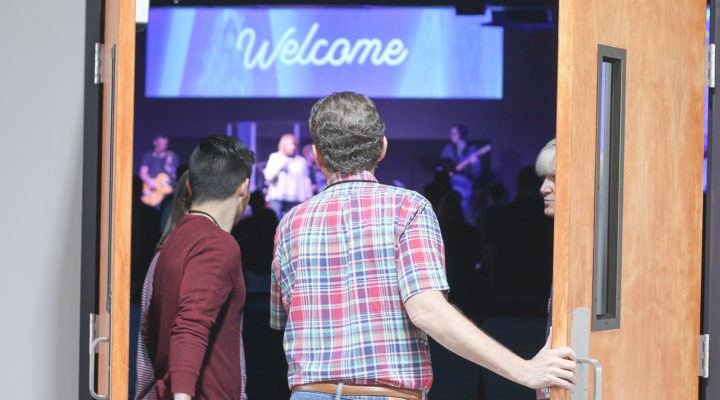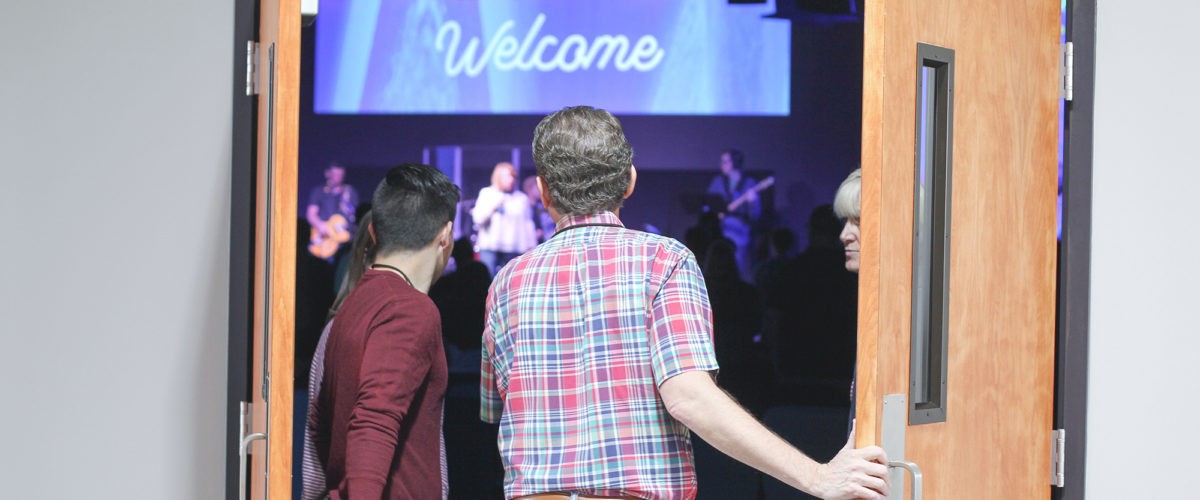Will churches stop in-person worship once again as the Delta variant of COVID-19 roars across the country? Will those churches that continue to meet in person return to requiring masks and social distancing?
These are the urgent questions facing church leaders across America as COVID infection rates escalate once again just weeks after even many of the most-cautious congregations had returned to in-person gatherings, some not even requiring masks.
Except in the most theologically and politically conservative churches — which have demonstrated throughout the pandemic an aversion to caution — things had just begun to feel more normal than they had in months. Since late May, as infection rates dropped and more Americans got vaccinated, churches that had been online-only for months welcomed worshipers back to their buildings. And then as things appeared to be even better, many dropped their mask mandates in recent weeks.
Now, everything feels different yet again. The uptick in new coronavirus infections has appeared so suddenly and with such force that the forecast for this coming Sunday may appear vastly different than it did for last Sunday.
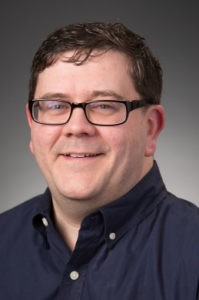
Josh Speight
“Prior to last week, Church at Wieuca had relaxed our masks and social distancing for worship and other events. We were moving toward a normal fall schedule,” said Joshua Speight, associate pastor at the Atlanta church. “With the latest updates from the CDC, we quickly made changes. Masks are highly encouraged for vaccinated people. Masks are required for unvaccinated people. Our staff is wearing masks for worship. Masks continue to be required for our Day School and our After School Program. We have returned to some social distancing. We delayed the start of our Sunday school scheduled for August until after Labor Day.”
That typifies the response of many congregations as they quickly reevaluate in light of new data.
Other congregations that had not fully reopened remain firm in their resolve that the time is not yet right. Among those is St. Stephen United Methodist Church in Dallas, which continues to hold virtual worship only. The church’s COVID “return team” continues working on a plan to resume in-person worship sometime this fall.
On the other end of the spectrum, pastors who have been COVID deniers and vaccine deniers said they would not be swayed by news of this new, more-contagious variant.
Pastor Tony Spell has been an outspoken critic of coronavirus restrictions throughout the pandemic. The Pentecostal pastor of Life Tabernacle Church in Baton Rouge currently faces multiple charges for defying coronavirus restrictions. He was back in the news this week, defying a statewide mask mandate issued by Gov. John Bel Edwards.
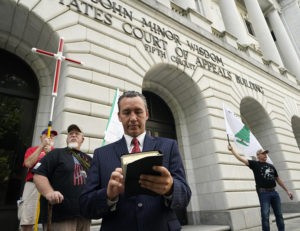
Tony Spell, pastor of Life Tabernacle Church of Central City, La., waits outside the Fifth Circuit Court of Appeals in New Orleans, Monday, June 7, 2021. Spell, who flouted coronavirus restrictions last year, prepared Monday to ask the court to revive his lawsuit challenging the restrictions. (AP Photo/Gerald Herbert)
“We will never comply,” Spell told Newsweek. “Everything that Gov. Edwards is doing is unlawful and unconstitutional. … Congress shall make no law respecting an establishment of religion. The shutdowns are unlawful as well as the mask mandate and employer forced vaccinations. This is still America even though our politicians do not acknowledge it.”
Louisiana’s Democratic governor reinstated the mask mandate as the state continued to record one of the lowest vaccination rates in the nation and ranked No. 1 nationwide for number of new COVID-19 cases per capita.
Expect more court action
On Monday, Aug. 2, the U.S. Supreme Court declined to hear a lawsuit brought by a Maine church seeking to preempt any new government restrictions on indoor assemblies or masking or social distancing. Associated Press reported that Calvary Chapel in Orrington had asked the high court to stop Democratic Gov. Janet Mills from enforcing or reinstating any pandemic-related restrictions due to the Delta variant of coronavirus.
The church’s attorneys described Mill’s previous restrictions as a 14-month “reign of terror.”
The request for a preemptive injunction was denied, but that doesn’t mean the court is unsympathetic to the church’s concern. Over the course of the pandemic, the Supreme Court was presented with no fewer than seven cases involving churches protesting government restrictions. As the shape of the court also changed since the start of the pandemic, the rulings tilted more in favor of free reign for churches despite government restrictions through public health orders.
In the last of those seven cases, which was decided late on a Friday through what is known as the court’s “shadow docket,” the court sided 5-4 with California pastors who opposed state public health advisories as infringing on their free exercise of religion.
“The Delta wave is likely to prompt a whole new round of litigation.”
“If any governments try to go down the path of closing worship again, this time around we have the benefit of the Supreme Court’s numerous rulings making clear that worship is not just important, but essential,” Eric Rassbach, vice president of the Becket Fund for Religious Liberty, told CNN.
Jim Oleske, professor at Lewis and Clark Law School, told CNN he expects the courts to be busy once again with church-related cases. “The Delta wave is likely to prompt a whole new round of litigation, with legal challenges being made to any new limitations on gatherings and any new requirements for masking or vaccination.”
In the present moment, as government leaders seek to staunch the spread of the latest COVID surge, urgent appeals to the Supreme Court will not be answered because the court is in recess until late September.
Americans not confident they can protect themselves
Meanwhile, fresh polling from Gallup finds Americans have become less confident that they can protect themselves when in public from catching coronavirus. The percentage who are “very confident” about being able to protect themselves fell to 38% at the end of July, after rising to a pandemic high of 51% in May and remaining near that level, at 50%, in June.
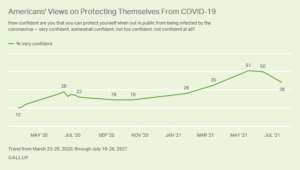 For most of last year, fewer than one in four Americans were very confident they could protect themselves when in public, Gallup said.
For most of last year, fewer than one in four Americans were very confident they could protect themselves when in public, Gallup said.
Gallup’s latest data come from a July 19-26 update of its monthly COVID-19 tracking study.
Ironically, Gallup found that worry about community spread is substantially higher among fully vaccinated adults (78% are very or moderately worried) and those who plan to get vaccinated (77%) than it is among adults who do not plan to get vaccinated (19%).
Gallup found, as of late July, that 68% of Americans ages 18 and older say they are fully vaccinated, which loosely aligns with vaccination data tracked by the U.S. Centers for Disease Control and Prevention. The CDC currently reports that 70% of U.S. adults age 18 and older have received at least one dose of a vaccine and that 60% are fully vaccinated.
Gallup also found that 23% of adults ages 18 and older do not plan to be vaccinated — a number that aligns with earlier polling data on vaccination but that appears to be changing even this week as news of the Delta variant has spurred an uptick in vaccinations.
Americans have become less confident that they can protect themselves when in public from catching coronavirus.
The bottom line, Gallup reported, is that spread of the Delta variant “has put a significant damper on public optimism about the pandemic, with 45% now saying the situation is getting worse, up from a mere 3% in June, when 89% saw improvement. As a result, Americans are less sure they can protect themselves from the coronavirus when out in public.”
Vaccination mandates?
While some conservative evangelical Christians have compared vaccine mandates to their end-times view of the “mark of the beast,” the new reality is that many employers are now moving toward some kind of vaccine requirement. How that will spill over to churches remains to be seen.
It seems possible that some churches concerned about doing their part to protect public health could impose their own vaccine mandates for worshipers. And any state or federal mandate that could be enacted regarding public gatherings and vaccination requirements most likely would apply to churches — unless there were a religious exemption included.
Existing law provides religious exemptions for similar vaccine mandates enacted by employers, provided accommodations can be made.
CNN’s report noted that Title VII of the Civil Rights Act prohibits discrimination based on race, color, national origin, religion and sex. And according to Equal Employment Opportunity Commission guidance, Title VII requires an employer to “provide reasonable accommodations because of a disability or a sincerely held religious belief, practice or observance.”
In theory, churches could require vaccination against childhood diseases such as smallpox, but there is no history of such requirements because they were unnecessary.
Also, current requirements for other vaccinations typically given during childhood apply mainly to public schools and universities, not to churches. In theory, churches could require vaccination against childhood diseases such as smallpox, but there is no history of such requirements because they were unnecessary. Government requirements on vaccination of schoolchildren took care of the problem.
Could the same be true for COVID and churches? If Americans were required to be vaccinated to do other things — such as go to work or school — that likely would create herd immunity in churches. Unless those churches were populated primarily by people who sought religious exemptions from vaccination in their work and school contexts.
There is court precedent for vaccine mandates. In 1905, for example, the Supreme Court upheld a vaccine mandate in Jacobson v. Massachusetts, a case concerning an outbreak of smallpox. The court ruled that individual liberty is not absolute in such situations.
“Nothing in federal law prohibits an employer from requiring vaccines so long as they provide accommodations to people with disabilities and those with sincerely held religious beliefs,” Sharon Perley Masling, director of workplace culture consulting at Morgan Lewis, told CNN. “Legally it appears that it will be difficult for a vaccine mandate challenge to succeed in federal court.”
Current guidance
While the current situation remains fluid, the CDC has issued recommendations for events and indoor gatherings.
“The event space should allow people who are not fully vaccinated against COVID-19 to remain at least 6 feet apart from each other whenever indoors. Other prevention strategies, such as wearing masks, should also be followed,” the guidance states. “In areas with substantial to high transmission, any outdoor space should allow people who are not fully vaccinated to avoid crowded situations and sustained close contact. Indoor spaces are more risky than outdoor spaces because it can be harder to maintain physical distancing indoors, and viral particles disperse more easily outdoors than indoors.”
And the CDC reminds churches of this fact about time and space: “In general, the more people who interact, the more closely they interact, and the longer those interactions occur, the greater the risk of getting and spreading the virus that causes COVID-19.”
Related articles:
Another Friday night, another Supreme Court rapid ruling on churches and COVID
Advocacy group that fought COVID church closures in California awarded $2.1 million for legal fees
More churches plan reopenings cautiously, joyfully and with flexibility
Not all churches are back to indoor or in-person worship, and those that are have some questions

